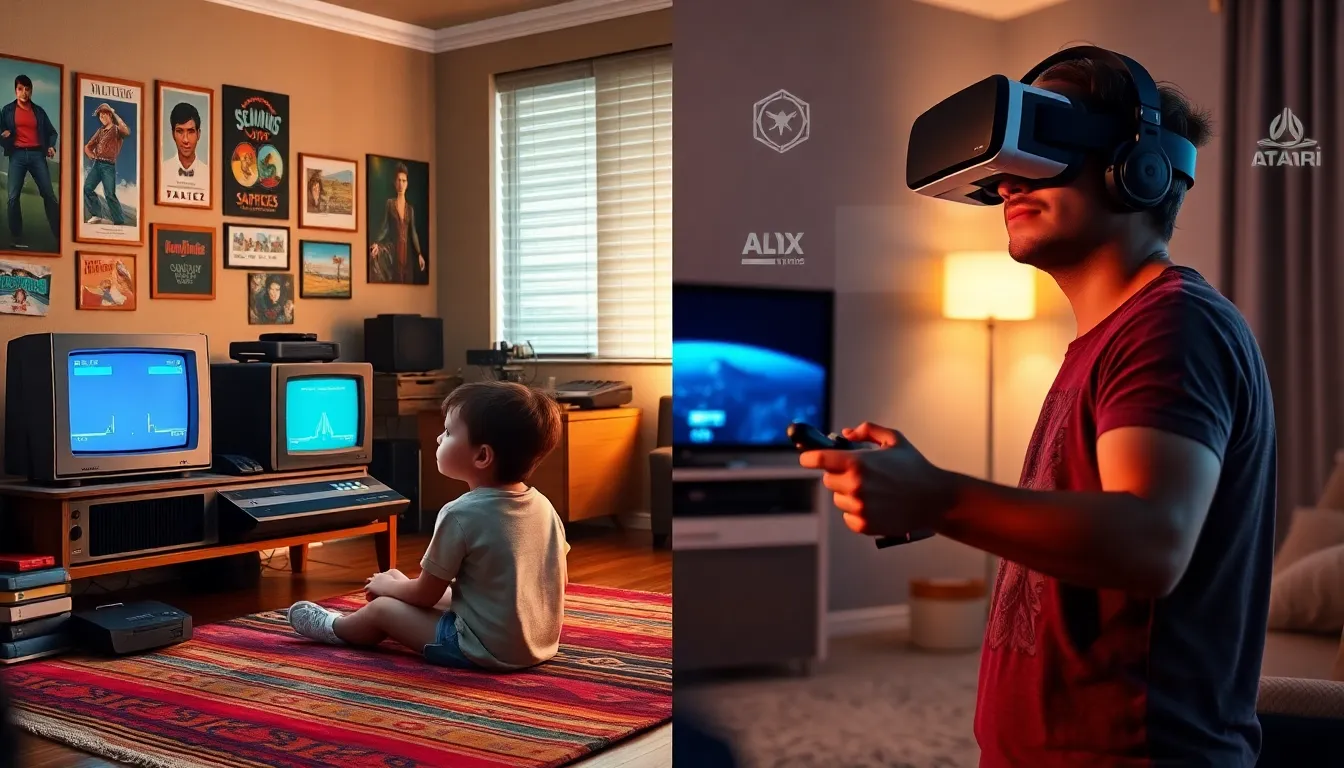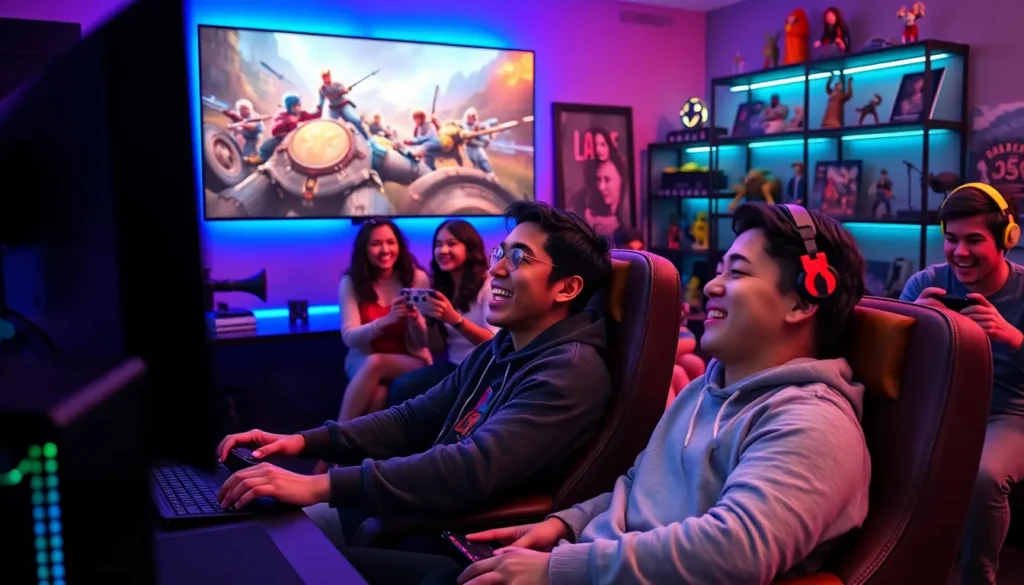In an age where gaming has evolved from pixelated 8-bit graphics to immersive virtual reality experiences, the culture surrounding it has grown exponentially. Gaming isn’t just a pastime: it encompasses a vast array of communities, genres, and trends that shape our entertainment landscape. This article explores various aspects of gaming culture, from its evolution to the role of streaming, to understand what makes gamers tick.
Table of Contents
ToggleThe Evolution of Gaming: From 8-Bit to Virtual Reality

The journey of gaming is a testament to technological advancement and creative imagination. In the late 1970s and early 1980s, gaming began with simple 8-bit consoles like the Atari 2600 and games such as “Pong” and “Space Invaders.” These early games laid the groundwork for what would become a billion-dollar industry.
As technology progressed, so did gaming. The introduction of 16-bit systems like the Super Nintendo in the late 1980s brought more vibrant graphics and complex gameplay, captivating a generation. By the 1990s and the arrival of CD-ROMs, games transitioned into 3D realms with titles such as “Doom” and “Final Fantasy VII,” which offered deeper narratives and rich immersive experiences.
Fast forward to today, where cutting-edge technologies have given rise to virtual reality (VR). VR games such as “Beat Saber” and “Half-Life: Alyx” allow players to physically engage within digital worlds, making them feel more connected than ever before. The trajectory from 8-bit to VR illustrates not only technological advancements but also the evolving expectations of gamers.
Popular Game Genres and Their Impact
The gaming industry boasts a diverse range of genres, each contributing uniquely to the cultural landscape. Action and adventure games, like “The Legend of Zelda,” often serve as entry points for new gamers, blending storytelling with engaging gameplay. In contrast, role-playing games (RPGs) such as “The Witcher 3” allow players to immerse themselves in rich narratives, often fostering empathy for characters and situations far removed from their real lives.
Simulation games like “The Sims” offer a different avenue for social experimentation, encapsulating daily life in a digital format. These genres encourage players to explore various aspects of life, from building relationships to managing complex systems.
Finally, competitive genres like first-person shooters (FPS) and battle royales, including “Call of Duty” and “Fortnite,” have transformed gaming into a spectator sport. Esports attracts millions of viewers worldwide, making competitive gaming a cultural phenomenon in its own right. This genre’s popularity demonstrates gaming’s capacity to foster community and ignite passion, underscoring its impact on contemporary culture.
The Community Aspect of Gaming
One of the most significant aspects of gaming is the sense of community it fosters. Whether through online forums, social media platforms, or local gaming conventions, gamers form connections that transcend geographical barriers. Communities develop around shared interests, from specific games to gaming platforms, creating spaces where players unite for camaraderie and competition.
Platforms like Discord serve as digital gathering places where gamers can communicate, strategize, and form friendships. These interactions enrich the gaming experience, making it about more than just gameplay: it becomes a shared journey. Steam and Reddit further exemplify this community spirit by providing avenues for players to discuss strategies, share content, and even seek help from fellow gamers.
Gaming events, such as conventions and tournaments, amplify this community aspect. Events like PAX and E3 gather thousands of fans, transforming passionate gamers into a unified audience, celebrating their love for the medium together. This communal experience reinforces the idea that gaming is not merely an individual hobby but a cultural movement that brings people together.
Game Development: Behind the Scenes of Game Creation
Game development is a complex process that involves numerous creative and technical disciplines. From conceptualization to final release, developers work tirelessly to bring games to life. This intricate process often begins with idea generation, crafting storylines, and designing characters and environments.
Once the concept is established, the development team, comprising programmers, artists, and designers, collaborates to turn ideas into reality through coding and graphic design. The complexity of modern games requires extensive testing phases to ensure functionality and user experience are up to par.
Also, game development is not restricted to big studios: indie developers have gained traction, creating innovative and unique experiences with limited resources. Games like “Hollow Knight” and “Stardew Valley” highlight how creative visions can flourish outside mainstream models, representing the heart of gaming culture and its accessibility.
The Role of Streaming and Content Creation
In recent years, streaming and content creation have transformed how gamers share their experiences and connect with audiences. Platforms like Twitch and YouTube have turned many gamers into public personalities, reshaping the relationship between players and the gaming industry.
Streaming allows players to showcase their skills, share tips, and engage with viewers in real-time, fostering a sense of community and interaction. Gamers can build substantial followings, sometimes leading to lucrative careers through sponsorships and partnerships. This phenomenon has created a new kind of celebrity where gaming experts entertain, inform, and inspire others.
Also, the rise of content creation has democratized access to gaming journalism. Gamers can now find diverse perspectives on games through video essays, reviews, and podcasts. This shift encourages more voices to contribute to gaming discourse, enriching the overall culture and fostering a more inclusive environment.
Future Trends in Gaming and What to Expect
As technology continues to advance, the future of gaming holds exciting possibilities. One significant trend is the integration of artificial intelligence (AI) into games, enhancing player experiences by creating more responsive and immersive environments. Games are likely to feature increasingly complex NPCs (non-player characters) that can adapt to player actions, making each gaming session unique.
Another promising trend is the increased focus on accessibility. Developers are becoming more aware of the need to create games that cater to diverse players, including those with disabilities. Features like customizable controls and visual aids are being prioritized, allowing everyone to partake in the joy of gaming.
Besides, the metaverse, a collective virtual shared space, promises to revolutionize how gamers interact and experience games. This concept amalgamates AR, VR, and social networking, allowing players to explore vast digital worlds altogether. As gaming technology continues to evolve, these trends indicate that gaming will become even more integrated into daily life, forging connections and experiences that transcend traditional boundaries.
Conclusion
The landscape of gaming culture is multifaceted, characterized by its evolution, diversity, and community spirit. From humble beginnings as niche entertainment to a robust industry that shapes modern culture, gaming has transformed how people connect and engage with stories. As technology advances, the future holds even more promise, ensuring that the journey of gaming will remain exciting and dynamic. The experiences shared within this culture not only entertain but also bond people across the globe, showcasing the extraordinary power of play.





